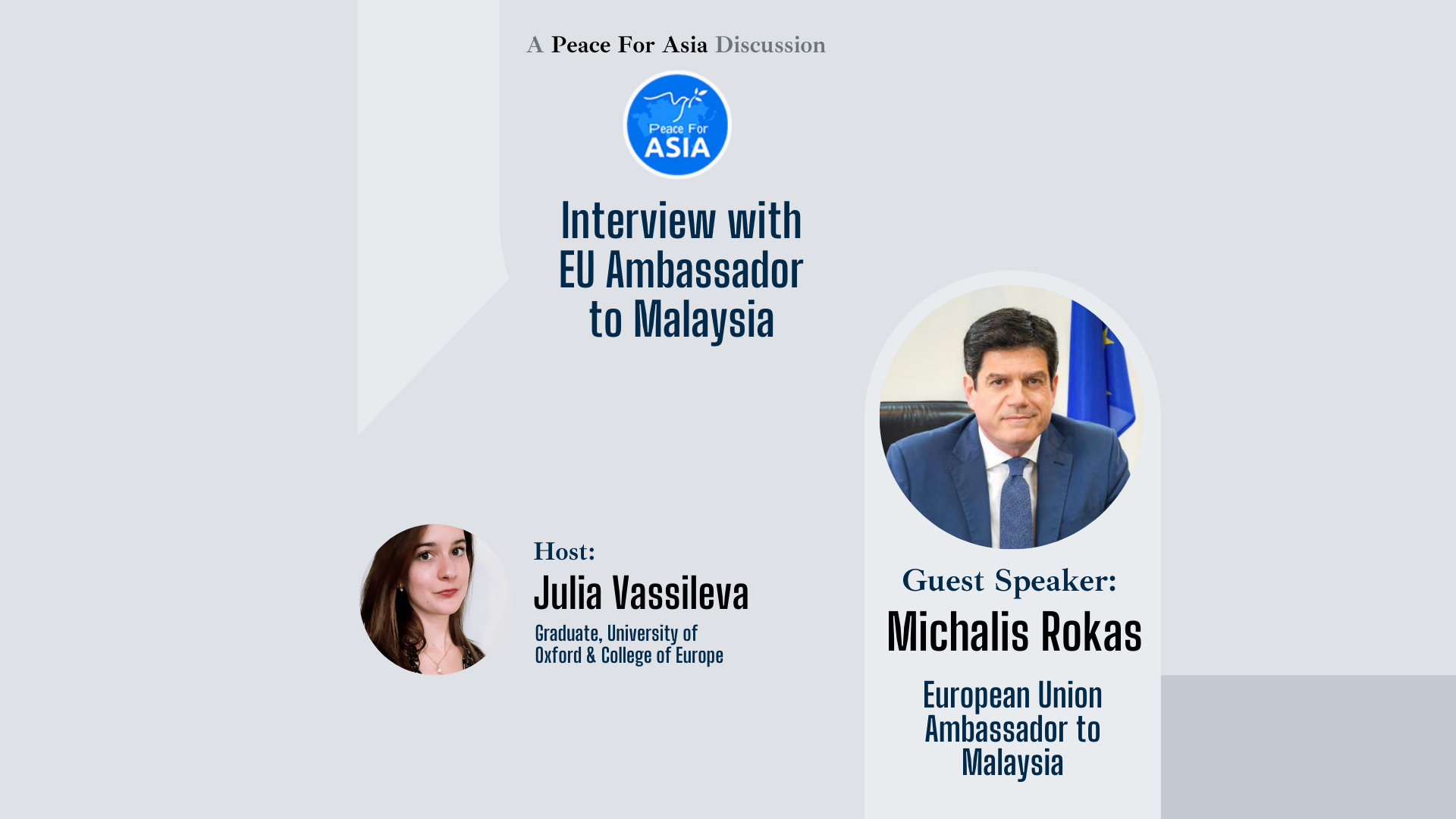Peace for Asia interviewed the EU Ambassador to Malaysia, Michalis Rokas to discuss the EU’s ties with Malaysia and the ASEAN. With over two decades of experience in foreign policy, Ambassador Rokas has served in senior diplomatic positions in New Zealand and Hong Kong before taking charge as the Ambassador to Malaysia.
As EU’s second largest trade partner in the South East Asian region, the EU-Malaysia relationship remains friendly, based on long standing ties. Almost 40 percent of EU’s trade passes through Malaysia’s shores and the EU remains a key exporter of engineering goods and cutting-edge technologies to Malaysia. For the EU, harnessing relationship with Malaysia is part of its broader ASEAN strategy.
Even though Malaysia does not qualify for development assistance due to its status as an upper middle-income country, the EU has provided for technical support and funded projects on inclusivity and women’s rights. The ambassador emphasised on the EU’s commitment to financing actions on Human Rights and promoting press freedom without any interference in the local value systems. Malaysia has also committed to abolish the death penalty provision in violation of certain offenses. The EU is in regular communication on the question of gender and inclusivity with the Malaysian government. Further, it has extended its actions to promoting a sustainable future for South East Asia with a special focus on eliminating plastic, better waste management technologies and reducing emissions. The presence of a large number of EU companies in Malaysia has resulted in positive spin-offs in the form of CSR funds for civic initiatives in the country. The EU also remains committed to protecting exotic biodiversity in Malaysia and seeks Malaysia’s support in potential collaborative ventures. It is also keen on reducing carbon footprint by developing Malaysia as a hub for green technology and green hydrogen. Malaysia has ports, industrial parks, hence an immense geoeconomic potential, but the EU remains committed to assisting Malaysia’s switch towards greener initiatives.
Having ambassadors of 16 EU member states in Malaysia has enabled it to synergize its efforts towards common regional goals. The success of the European foreign policy lies in the clarity of cooperation among different departments. The Global Gateway is one such successful product this cooperation. Aimed at boosting “smart, clean and secure links in digital, energy and transport sectors and to strengthen health, education and research systems”, Global Gateway intends to mobilize 300 billion Euros from across the world.
Commenting on the role of China in South east Asia, the ambassador mentioned that as a preponderant geoeconomic force in the region, Chinese presence comes with both benefits and concerns, as a major economic partner and simultaneously as a strategic player. The Chinese have no doubt brought major infrastructure projects to South East Asia, but there are concerns surrounding the nature of these investments. There is a lively debate on this issue and there is an ample room for the EU to introduce more sustainable and inclusive initiatives. The proliferation of Indo-Pacific partnerships like AUKUS or Quad highlight another aspect of the geopolitical realignments at work. In this context, the EU’s proposals come irrespective of any conditions as they are focused on development and inclusiveness.
There is already a lot of interest surrounding what the EU has in consideration for ASEAN as the we prepare for the first full EU-ASEAN summit in coming December. The ambassador predicted next six months to one year as a critical phase as the EU would have to finalize its proposals on long term cooperation considering the rapidly evolving geostrategic situation in Asia and Europe.
South East Asia remains critical to EU’s prosperity, considering its resources, manpower, growth and employment potential. The ambassador concluded with highlighting the key goal the EU intended to pursue, that is to evaluate common challenges, identifying potential partnerships and create a win-win situation for all.

